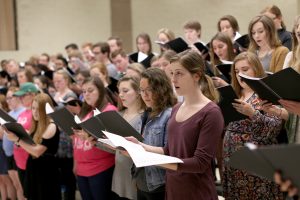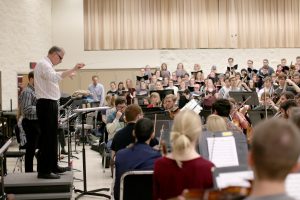
“The Passion of Jesus Christ,” composed by Dr. Rene Clausen, music professor and choral conductor, will have its world premiere April 8 and 9 in Minneapolis and Moorhead. Clausen wrote the work for the 500th anniversary of the Reformation, and it will not disappoint, according to his students.
Wyatt Steinke, a senior in the Concordia Choir, said he felt “The Passion of Jesus Christ” is Clausen’s writing at its best.
“You see a lot of his compositional style in it,” Steinke said. “[‘The Passion of Jesus Christ’ is] taking the best of some of his previous compositions, and even going beyond that; he’s introducing new ideas that I haven’t seen before in his other work. It’s a very drama-filled story, and I think Dr. Clausen does a great job of presenting that in the music. Right from the very beginning, it’s big and powerful.”
Steinke feels that, though passions are a widely used, especially during Holy Week, Clausen’s Passion, a narrative of the suffering and death of Jesus, is different from others he has heard. Many passions begin at the start of Holy Week, while Clausen’s starts at creation. Clausen’s also presents other characteristics not often heard in other passions.
“It goes from very loud moments to very quiet moments, and everything in between,” Steinke said. “There’s different things that you’re not used to hearing choirs sing that may surprise you. There’s speaking, there’s shouting, there’s whispering. There’ll be a bunch of soloists.”
The soloists will be a mix of faculty, staff and students. “The Passion of Jesus Christ” will also feature poetry written by the religion department’s Roy Hammerling.
Steinke explained that working under Clausen, as the composer of the piece, has been an exciting and rewarding experience.
“What I think is added, when he’s conducting his own piece, is [Clausen] can tell personal stories about it,” Steinke said. “He can say, definitively, this is why a chord is where it is. It’s really quite a treat to be able to spend this much time with a major work, with the composer himself, because he shares those insights with us, and that adds a lot to our own experiences as well.” Freshman Lindsay Schneider, who sings in the Kantori choir, echoed Steinke’s sentiment.
“If anything, [Clausen as the composer] gives us better directions, because it’s his vision. He knows exactly what he wants from it,” Schneider said.

Steinke and Schneider both agreed that one of their favorite aspects of the work, and what makes it unique, is Clausen’s use of layering traditional hymns and soloists.
“The men at one point are singing ‘Go to Dark Gethsemane’,” Steinke said. “While the women are playing the role of Peter, and saying ‘I will never deny you.’ So, there’s this beautiful choral underneath, but over the top, the women are introducing dissonance. It throws the listener; they’ll hear this beauty in the story, while at the same time, there’s all this pain and suffering interspersed together.”
Kyle Stengel, a senior and the Concordia Choir president, felt that the main thing he wants the audience to walk away with is to understand the story.
“I understand the story; you know, you hear the stories individually, and you hear them throughout Holy Week, and you know them,” Stengel said. “But it’s not often you get them in this hour-long chunk, where you feel the mood and the emotion set to music.”
According to Stengel, one of the most powerful strengths of the piece is the music, which serves as an amplifying tool while telling the story.
Steinke wants audiences to walk away with the complexity of the story of Holy Week, and that the messages that are present, both the week and “The Passion of Jesus Christ”, aren’t just for Christians.
“Even as someone who’s not really a Christian, I find there’s so much to glean from the events of that week, looking at it from a historical perspective,” Steinke said. “I think Dr. Clausen does a great job of putting all of those emotions together, tying it into context of Biblical events, and what was being felt in those moments. I think [the audience] should take away just how complex the events are of that week, and just how meaningful it is.”
As a first-year student, Schneider explained the excitement and pride she feels to be a part of this year’s Holy Week celebration.
“I never would have imagined I’d be part of something so big,” Schneider said. “It’s been a great experience working on it these past few weeks so far. It’s very powerful, I think; singing it, for me, is very powerful. There are moments when I almost want to start crying because it is so overwhelming to think about.”
Steinke stated that he feels the Passion is an event that is worth attending, whether you go to music events on campus regularly or not. “We do an oratorical performance every year, and every year it’s good and valuable to see, but this is really sort of the pinnacle of Concordia music; this is Dr. Clausen at his finest,” Steinke said. “It tells a story that everyone kind of knows, but not everybody has really been exposed to it in this way. I really do think that’s important for people to see. And the music is just fantastic. There’s not a moment in it that I don’t like; and I think that’s rare in a piece of music of this scale, throughout the entire piece to like every part of it. It keeps you engaged throughout the whole piece.”
Stengel explained that his appreciation towards Clausen has deepened while working on the Passion.
“It’s a lot of pressure to have to compose something of this magnitude.” Stengel said. “It’ll be really rewarding; for [Clausen], for us, for everyone. I want as many people to be there and to appreciate this thing as possible. This is a great thing to have.”
“The Passion of Jesus Christ” will be performed on April 8, 7:30 p.m. at the Orchestra Hall in Minneapolis, Minn.; and on April 9, 7:00 p.m. in the Memorial Auditorium on campus.
“The overall vibe [of The Passion] is love,” Steinke said. “Jesus’s love for humanity, and God’s love for the world. Through all these terrible things, we remember why this is going on, and the story behind it. In rehearsals, especially, when we end with the end of the piece, and we see that conclusion, you really feel at the end that Jesus is alive and with you. So, I think that’d be the overarching vibe of The Passion, and of Holy Week: love and peace.”

